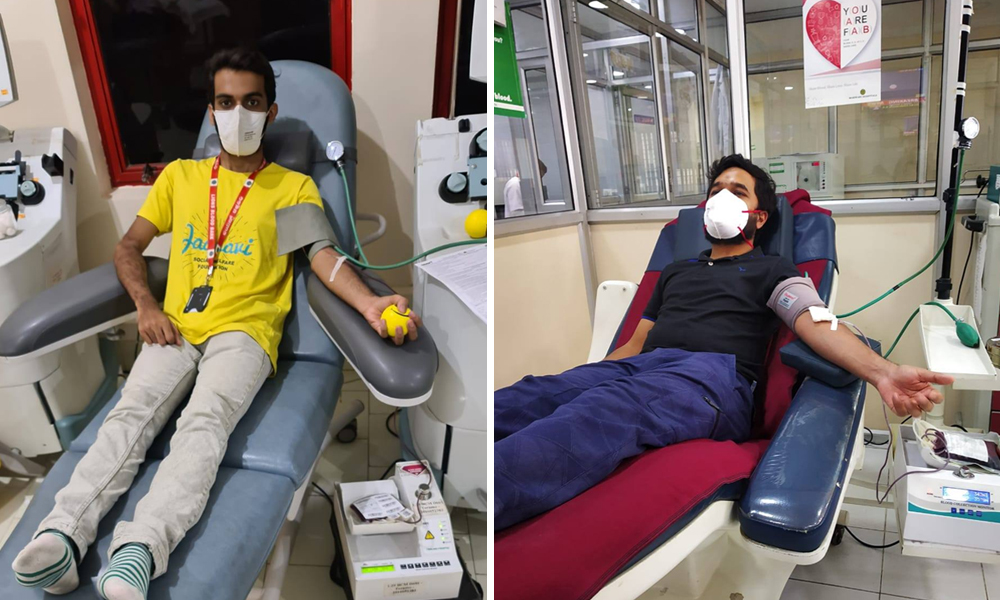
This 20-Year-Old Bengalurean's Team Is Ensuring Blood To Thalassemia, Cancer Patients Amid Lockdown
India, 18 May 2020 11:57 AM GMT | Updated 18 May 2020 12:47 PM GMT
Editor : Shubhendu Deshmukh |
Shubhendu, the quint essential news junky, the man who loves science and politics in equal measure and offers the complete contrast to it by being a fan of urdu poetry as well.
Creatives : Abhishek M
" An engineer by profession, Abhishek is the creative producer of the team, graphic designing is his passion and travelling his get away. In more ways than one, he makes the content visually appealing."
Till date, Bengaluru-based NGO, Khoon, has mobilised around 1,500 donors in a time span of one month, across Delhi, Gurgaon, Noida, Bengaluru, and Assam.
Janki Kumari was all set to welcome her baby on April 27. However, a day before the delivery, a crisis hit her family - there was no donor available to donate blood due to the ongoing nationwide lockdown.
Talking to The Logical Indian, 34-year-old Kumari recalls, "People were not available to give blood due to the lockdown. Even in the blood bank, the blood group I needed was not available. We went to so many blood banks, to no avail."
Panic had begun to settle in the family residing in Guwahati, Assam. With people confined to their homes and scared to step out due to the coronavirus crisis, getting a donor seemed far fetched. "We were so scared at the time," she says.
It was only after a Bengaluru-based NGO, Khoon, stepped in, that the woman got blood.
"It was like a miracle that I got a call from Khoon. They told me they had someone who could donate the blood group I needed. It was so convenient. They also called me and followed up till I got the blood, and even comforted me all along," Kumari recalls.
Khoon had managed to deliver blood to Kumari in under 30 minutes.
In another case in Guwahati, Ruma Chakraborty also found it extremely difficult to get blood for her 74-year-old father, who is suffering from anaemia.
"People were not coming up for donation because the (COVID-19) crisis is still on. Even when people are willing, their family members are not supportive enough because they are also scared," Chakraborty tells The Logical Indian.
Here too, it was Khoon that came to her rescue.
"Amid all these things, there were superb people who donated blood. Charu from Khoon helped me like anything, I would say that she's the real angel. Even during these difficult times, she's making people's lives easier," says Chakraborty.
Blood Donation During Lockdown
Ever since the nationwide lockdown came into effect, blood donation drives have been cancelled and donors are not coming forward to donate blood. This has further caused an extreme shortage of blood across India. To combat this crisis, several NGOs have come forwards, Khoon being one among those.
Amid the lockdown, Khoon has been working relentlessly to end blood scarcity. They have been trying to ensure that blood banks remain stocked and critical patients don't lose out on essential healthcare during this COVID-19 crisis.
"One of the major issues right now is that Thalassemia and Blood Cancer patients are not receiving blood at the right time for their transfusions. They require a donor every 15 days. But, due to the lockdown, no donors are willingly coming forward to donate blood," says Chethan.
On March 24, Khoon started a toll-free national emergency helpline number (1800 890 6465). It also arranged an ambulance service and curfew passes for all willing donors.
"We promoted the helpline numbers to donors so that the donors who are willing to donate blood can reach out to us on the helpline number, register themselves, and post that, we can reach out to them, whenever there is a requirement," says the 20-year-old Chethan.
Till date, the team has had around 2,000 registrations and have mobilised around 1,500 donors in a time span of one month, across Delhi, Gurgaon, Noida, Bengaluru, and Assam.
"Right now in India, the blood collection statistics are - 95% blood collection happens in blood donation camps. Only 5% takes place in the blood bank. So, for example, in a situation where there is a lockdown, due to these statistics, 95% of the collection is stopped. Which is a big mistake in how we have been following blood donation practices," explains Chethan.
"If at least our walk-in donor' percentage was around 10 to 15 per cent, then it would have dropped to 5% so that at least there is one donor walking into the blood bank and donating blood in spite of the lockdown. But right now we only have 1 per cent of donors coming forward and donating blood at the blood bank. So I started Khoon to change this - to increase walk-in donations, instead of being completely dependent on blood donation camps," he explains.
Convincing donors that it is safe to come out and donate blood has been the major challenge Khoon has been facing amid the lockdown.
"We have collaborated with a couple of blood banks in all these cities, making it easier to issue curfew passes, so that the donors can travel to the blood banks and go back home after donation. Along with that, we are also providing transportation facilities for donors who do not have transportation. We have tied up with hospitals to provide their ambulance for the same." he says.
They have also partnered with a couple of Thalassemic patients support groups and have been helping them with donor mobilisation for the thalassemic patients across their centres.
How It Works
Khoon has 10 operators working on their helpline number. Once they receive a call, depending on the location, the call is forwarded to that location-specific operator.
"Once we receive the request details - which hospital, patient name, which blood group is required and how many units - we reach out to donors. As soon as there is a donor confirmation, we get a curfew pass for the donor, if he has his own travel arrangements. If not, we arrange to pick up and drop for him/her from their house to the blood bank," explains Chethan.
Once the donor reaches the blood bank, they then share the donor's details with the patient attender.
Precautions Taken
Due to the ongoing COVID-19 crisis, as a precaution, they also ask donors if they have travelled internationally in the last 28 days, if they have been in touch with somebody with travel history, or have any symptoms of COVID.
"If they answer yes for any of these questions, we make sure that the donor is deferred from the donation and made to self-quarantine themselves," says Chethan.
In addition, in all blood banks Khoon has partnered with, they make sure that sanitisation is done regularly, and both the equipment used for blood donation, chairs, etc are being sanitised after every donation. Furthermore, at the entrance of the blood bank, sanitisers and masks are made available for donors.
All blood banks are running with 50% staff and allow only a limited number of donors at a time so that there is no overcrowding.
In terms of transportation vehicles, in four-wheelers, only one donor is picked up along with the driver. If it's an ambulance, three donors are picked up. After every pick-up and drop, the entire vehicle is sanitised and cleaned.
Blood Shortage In India
Even under normal circumstances, India has been facing a severe shortage of blood. According to a 2018 report by the National AIDS Control Organization (NACO), India falls short of 1.1 million units of blood annually. While the national demand was for 14.6 million units, the supply was 13.5 million units. However, the annual collection reported by NACO in the country was 11.1 million units in 2017.
The report further said, "There should be 62.3 donations per 1,000 eligible population(6.23% of the eligible population) in a year to address the population need; 34.3 per 1000 eligible population (3.43% of the eligible population) should donate blood to address the clinical demand. However, the actual supply per 1,000 population was 26.2 per 1,000 eligible population," the report added.
Talking about the availability of donors in India, Chethan M Gowda, Founder of Khoon, says that there is a lack of committed voluntary donors. Furthermore, blood donations in India are also surrounded by many misconceptions.
One of the common misconceptions among donors is that if they donate to a blood bank, it will charge the patient for blood, which leads to many donors only donating directly to donors, says Chethan.
"Blood processing charges apply even if you donate it to a blood bank or donate it at a hospital directly to a patient. The only difference is, if you donate at the hospital, the patient family will pay the charges during discharge, and if you donate at the blood bank, the patient family will pay the charges when they collect the blood," Chethan tells The Logical Indian.
"Due to this misconception, most patients do not go to the blood bank. They wait for particular patient requests to come in to donate. So, we are trying to change that mindset, making them understand that it is the same procedure, same help you're doing, same number of lives you're saving irrespective of whether you donate at a blood bank or at a hospital," he adds.
Another reason why most people do not come forward to donate blood is the fear of needles. To combat this, Khoon has been conducting awareness drives among school and college students.
How Khoon Started
Hailing from Bengaluru, Chethan, who is currently pursuing his third-year mechanical engineering, was only 16 when he started Khoon. Losing his teacher due to the unavailability of blood at the right time was what prompted the youngster to start Khoon.
"When I was 15, after my 10th board exams, I had a couple of friends who were looking for blood donors and found it very difficult to find donors. That's when I started organising blood donation camps. One year down the line, I realised that this is something which I am closely associated with, and I need to bring a considerable change in this field, and started Khoon in 2016," recalls Chethan.
Khoon was then registered as an NGO in January 2018.
Every year, across India, they conduct six blood donation camps. They mainly mobilise donors to blood banks. At present, they have a database of more than 1,20,000 blood donors. They have also saved nearly 30, 000 lives in 2019-2020 alone.
 All section
All section














